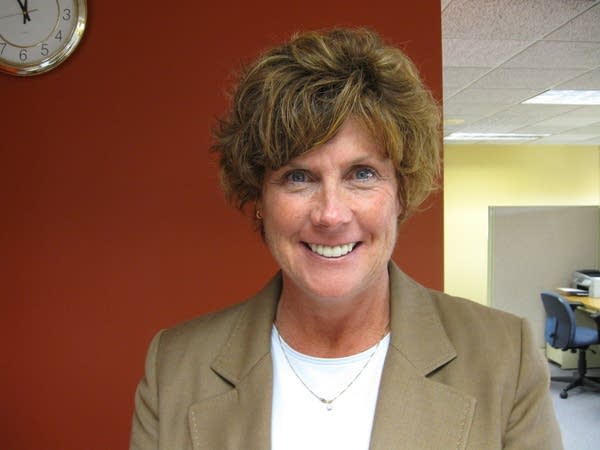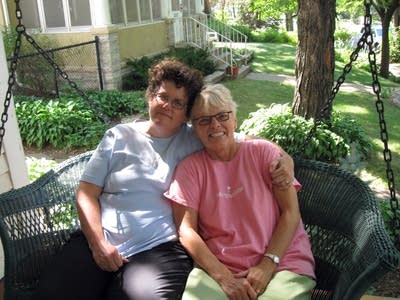Catholic family with lesbian sister weighs marriage amendment
Go Deeper.
Create an account or log in to save stories.
Like this?
Thanks for liking this story! We have added it to a list of your favorite stories.

In the 16 years since Eileen Scallen called to say she was bringing a girlfriend home for a school reunion, her five brothers and sisters have become accustomed to having a gay sibling.
Scallen had made a comfortable life for herself in San Francisco, and at 36 was a law professor. On a trip home to Minnesota, she met and fell in love with Marianne Norris, a former nun and the mother of two grown daughters and then a high school principal.
She later moved back to Minneapolis to live with Norris, who her siblings now consider one of the family.
But Scallen worries that their loyalty to her may only go so far. She fears they won't understand her opposition to proposed constitutional amendment that would define marriage as between one man and one woman. Accepting a gay sibling and her partner is one thing, but agreeing that they should have the right to marry — an idea Scallen said goes to the heart of her most important relationship — is a much bigger step.
Turn Up Your Support
MPR News helps you turn down the noise and build shared understanding. Turn up your support for this public resource and keep trusted journalism accessible to all.
"The fact that they might not honor that, and I might find out, is really painful," Scallen said.
Audio: The Scallens discuss the marriage amendment.
Video: Minnesotans speak out about the marriage amendment.
Minnesota already has a law on the books defining marriage as between a man and a woman. Supporters of the amendment, which will be on the ballot in November, say that unless the state's constitution is changed, gay rights advocates will continue their push for a law that legalizes same-sex marriage.

POLLS VS. FAMILY TIES
According to a recent poll by the Pew Forum on Religion and Public Life, in 2010, 46 percent of Catholics support gay marriage while 42 percent are opposed. Polls show that Minnesotans are evenly split on the issue, which likely will divide some families.
That's a concern that Scallen has long struggled with. In 1999, as she and Norris planned a commitment ceremony at Norris' home, they worried that Scallen's siblings might react.
"I was struggling because I knew my brothers and sisters were not ready," Scallen said. "They were not ready for that."
So the two women held a private ceremony, without their families. It was just the two of them, and a friend who witnessed the event.
"We wrote our own vows and we had our own ritual," Scallen recalled. "I sobbed through the whole thing, so I was grateful no one else was there. It was so emotional and so meaningful."
As meaningful as the ceremony was to them, it didn't give them the legal protections of marriage. They've drawn up wills and health directives to protect the one who outlives the other. But Scallen is quick to point out that they can't write up contracts to give themselves the rights a married couple has. They can't sue for wrongful death, or receive survivor's benefits from Social Security.
Their inability to marry led Scallen to give up her teaching job at Hastings College of Law in San Francisco.
When the two met, Norris was near retirement in Minnesota and more financially vulnerable if she were uprooted.

"If we had been able to get married, I wouldn't have had to leave Hastings," said Scallen, now a law professor at William Mitchell College of Law. "I wouldn't have had to leave San Francisco because Marianne could have had my pension.
"If something had happened to me, she could have had my benefits and so it wouldn't have been a problem."
For Scallen, the issue is about whether they agree the couple's relationship should be entitled to the same legal status enjoyed by straight couples. Although she has talked to her brother and sisters about her relationship, she hasn't discussed the amendment with them and is not sure she can count on them to vote against it.
As Catholics who grew up in Annunciation parish in South Minneapolis in the 1950s and 60s, the Scallens were taught that homosexuality is a sin. All are practicing Catholics and aware that the church's leaders in Minnesota have made passage of the amendment a political priority.
But Scallen's siblings are wrestling with the issue.
Her oldest brother Tommy, an events promoter in downtown Minneapolis, is a practicing Catholic, but plans to vote against the marriage amendment
"I want my sister to be happy," he said. "If two people want to make this commitment and they're serious about it and they go ahead and do it, you know, so be it. Fine. Success! It's a tough road. I want to see people happy, don't want to dictate how they live their lives."
Sheila Gregory, the second oldest of the Scallen siblings, lives in Edina and isn't sure how she's going to vote.

Still, last fall, when Gregory received a DVD the Archdiocese of St. Paul and Minneapolis mailed to Catholics urging them to vote to protect traditional marriage, she didn't watch it.
"I got it and I just thought, 'No, I'm not even going to look at it," Gregory said. "I figured it might upset me that the church has come down with such a harsh opinion. I mean these are people that just want to live their lives."
Next in the birth order is Patrick Scallen, another attorney in the family. He bought the Scallen ancestral home in Minneapolis from the family's late mother, and attends Annunciation Church, the parish where they all grew up.
Like Gregory, Patrick doesn't yet know how he'll vote on the amendment. He's struggling between what he's seen of his sister's relationship with Norris, and the position of Catholic leaders.
"If the church says, 'This is the way,' I generally want to believe that and toe the line," Patrick Scallen said. "But there are some issues, and this is probably one of them, that bear more thought."
The youngest sister, Maureen Scallen Failor, of Bloomington, describes herself as a fiscal conservative and a social liberal.
"Will I vote? I honestly can't say one way," she said. "I'm almost a point to not vote just to make a statement that government has no place in this. That's kind of where my position is at."
Scallen Failor knows if she leaves the question blank, it will count as a no vote and support her sister's position. It would be her way of protesting the issue being on the ballot. Archbishop John Nienstedt has made passage of the marriage amendment a top political priority. Scallen Failor sees it differently.

"Right now I'm not really happy with the Catholic Church," she said. "However, that is where I find my God. So I kind of put the institution of the religion to the side."
Scallen Failor's twin, Tim Scallen, declined to comment. He said he preferred to keep his views private, but loves and supports his sister.
For those keeping a tally, Eileen Scallen has one sibling who will vote with her against the amendment. Two say they don't know which way they'll vote. And one might not even vote on the amendment.
But without hesitation, they all agree one thing: If their sister could marry her partner, they'd be there.
"With bells on," Scallen Failor said. "She was there for my wedding. She was my maid of honor. Absolutely."
Dear reader,
Political debates with family or friends can get heated. But what if there was a way to handle them better?
You can learn how to have civil political conversations with our new e-book!
Download our free e-book, Talking Sense: Have Hard Political Conversations, Better, and learn how to talk without the tension.




